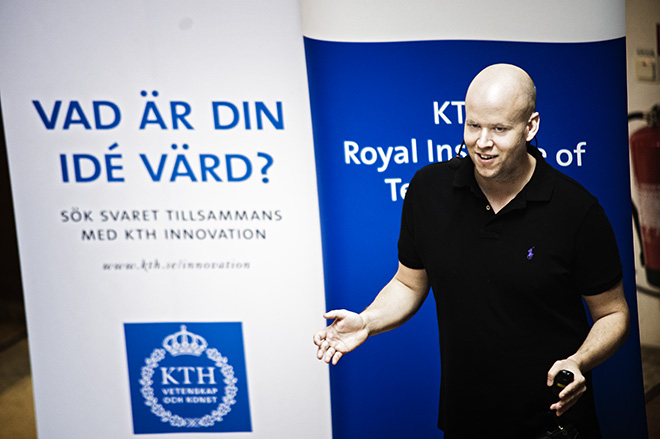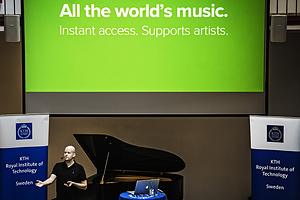For Spotify founder, innovation combines science and art
Innovators
He has been called the saviour of the recording industry. In any case, Daniel Ek’s creation, Spotify, has made an enormous selection of the world’s recorded music available on computers and mobile phones. On Monday, the Spotify founder visited KTH Royal Institute of Technology in Stockholm.

“Sweden is the best country to start an IT business in,” Ek says. “There is a strong tradition of engineering knowledge here, and there are so many qualified IT engineers.”
Last December, Ek was awarded KTH’s Great Prize, which includes a check for SEK 1.2 million. He returned to KTH on Monday to deliver a motivational talk to students on the topic of creativity and entrepreneurship.
The Stockholm native began with his personal story. He was given a guitar for his fourth birthday, and he got a computer when he was about 5. From then on, Ek says music and computers became his life.
“I played guitar, programmed and created applications. In that way I stimulated both the right and left sides of my brain. Combining my two biggest interests made me a more creative person than I otherwise would have been. And it was also by bringing together science and art that Spotify was created.”
Ek started the music service with Martin Lorentzon in 2006, at a time when record labels had been lacerated by sharply declining sales and music downloading had been skyrocketing for several years.
“The question was how could we create something that both supported the artist and favoured those who listen to music. We wanted to introduce a paradigm shift and we worked hard at convincing the market that the business model for this would work.”
The answer was a streaming service for digital music that helped to “fundamentally change the way people consume music,” as the KTH Great Prize citation described it. And the service still continues to evolve.

Spotify recently teamed up with Twitter and last week launched its service in Latin America and Asia. Ek says future success will come from increasing personalization of the music service, in the form of recommendations.
“We do hundreds of user tests every day to evolve the service. The most difficult thing is to understand the psychological factor. Questions that come up are, for example, what makes a particular song a hit? To understand that, it’s not enough to be good engineers. We also have to become behaviourists,” Ek says.
Ek has been described as a creative ideas man and a recruiting genius with a phenomenal ability to attract investors. In describing his journey from a makeshift office in his parents’ house to the international company with nearly USD 1 billion in sales, Ek reveals himself as an individual with great tenacity and willpower.
But being innovative is not that remarkable, he told his audience, before presenting them with a challenge.
“Innovations are never entirely new. The success comes from combining things that already exist and trying to solve a problem that one is really involved in. Try it yourself. Set aside a day to let your mind wander. What are the problems in the world that you want to solve? And how can you use your education and knowledge to meet that need?”
Watch the video here:
Christer Gummeson

